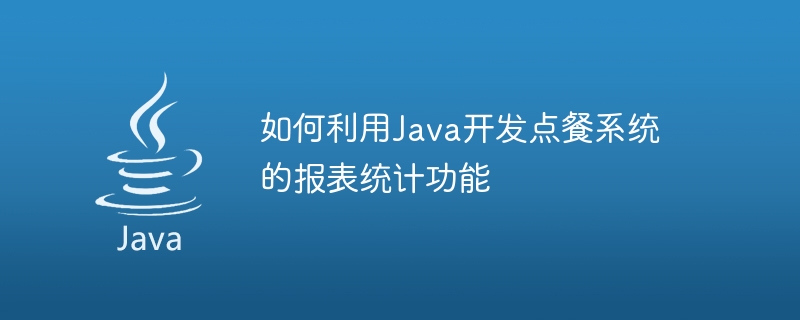Home >Java >javaTutorial >How to use Java to develop the report statistics function of the ordering system
How to use Java to develop the report statistics function of the ordering system
- 王林Original
- 2023-11-01 13:51:34983browse

How to use Java to develop the report statistics function of the ordering system
With the rapid development of Internet technology, the ordering system has become a standard feature of many catering companies. In the ordering system, the report statistics function is a very important part. It can help catering companies conduct comprehensive analysis and evaluation of sales, profitability, etc. This article will introduce how to use Java to develop the report statistics function of the ordering system.
1. Requirements Analysis
Before developing the report statistics function, we first need to conduct a needs analysis to clarify the user's needs and system functions. Common reporting and statistical function requirements for ordering systems include: total sales statistics, product sales rankings, sales trend analysis, profitability analysis, etc. Based on demand analysis, we can determine what data needs to be collected and formulate corresponding statistical reporting algorithms and data display methods.
2. Database design
In the ordering system, data is very important. In order to realize the report statistics function, we need to design a suitable database and establish the corresponding data table. Common data tables include: dish information table, order information table, sales record table, etc. In database design, it is necessary to pay attention to the relationships between tables, so as to facilitate subsequent data query and statistical analysis.
3. Data collection
In the food ordering system, data collection needs to be carried out when the user orders, pays and other operations. By adding corresponding data collection logic to the code, we can obtain the user's ordering information in real time and store it in the database. During the data collection process, it is necessary to ensure the accuracy and completeness of the data to avoid data loss or errors.
4. Data Analysis
After the data collection is completed, we can start data analysis. Using the statistical analysis library in Java, we can write relevant algorithms to process and analyze the collected data. For example, we can calculate total sales, count the sales quantity of each dish, calculate sales trends in different time periods, etc. In addition, data analysis can also be used to evaluate the profitability of catering companies and understand the popularity of dishes.
5. Report Generation and Display
After completing the data analysis, we need to display the analysis results in the form of a report. By using the report generation framework in Java, we can present the analysis results to users in the form of charts, tables, etc. The report generation process usually includes the following steps: selecting the report type, setting the report parameters, generating the report, and displaying the report.
6. Report export and printing
In addition to displaying reports online, we can also provide users with report export and printing functions. Through file operations and printer drivers in Java, we can save reports as files in Excel or PDF format, and support users to export and print. In this way, users can not only view reports in the system, but also save or print them for offline review.
7. Security and permission control
When developing the report statistics function of the ordering system, security and permission control need to be considered. Only users with corresponding permissions can perform data query and report generation operations to ensure data security and privacy. Security and permission control can be achieved by adding user management, permission management and other functions to the system.
Summary
By using Java to develop the report statistics function of the ordering system, we can easily analyze and evaluate the sales situation. During the development process, steps such as requirements analysis, database design, data collection, data analysis, report generation and display, report export and printing are required. At the same time, security and permission control also need to be considered to ensure data security and privacy. It is believed that in the near future, the report statistics function will become a standard feature of ordering systems, bringing greater development opportunities to catering companies.
The above is the detailed content of How to use Java to develop the report statistics function of the ordering system. For more information, please follow other related articles on the PHP Chinese website!
Related articles
See more- How Can AtomicInteger Enhance Concurrent Programming in Java?
- How to set margins for buttons inside a LinearLayout programmatically?
- How to Generate Non-Deterministic Random Numbers in Java When Using a Fixed Seed?
- Why and How Should You Synchronize on String Objects in Java?
- How to Populate a ListView with an ArrayList in Android?

